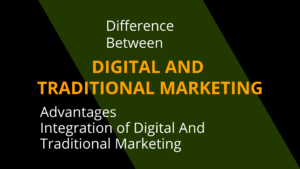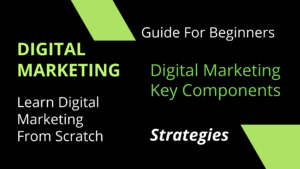Discover the Google SEO Expert Guide: Learn the basics of SEO, keyword research, on-page and off-page strategies, technical SEO, and more. Perfect for beginners looking to optimize their website and boost rankings.
What is SEO?
Search Engine Optimization (SEO) is the process of enhancing a website to make it more visible on search engines like Google. This involves optimizing various elements of a site to improve its ranking in search results, making it easier for users to find your content.
Why SEO is Important for Your Website?
SEO is important for increasing the visibility of a site’s online search engine ranking pages and driving traffic organically. When your site ranks higher on search engine results pages (SERPs), it attracts more visitors, leading to potential conversions and growth. For example, Company (XYZ) saw a 50% increase in traffic after implementing a solid SEO strategy.
Overview of Google SEO Expert guide
Your comprehensive resource for learning essential techniques to optimize your website effectively for Google. This guide “Google SEO Expert Guide” covers everything from keyword research to technical SEO and backlinks, ensuring you have the tools needed to succeed.
Understanding Google SEO Basics
What is Google SEO?
Google SEO, or Google Search Engine Optimization, involves optimizing your website to rank higher on Google’s search results. This includes on-page elements like content and meta tags, as well as off-page factors such as backlinks.
How Google Ranks Websites
Google uses a complex algorithm to rank websites based on various factors, including relevance, quality, and user experience. Key ranking factors include content quality, backlinks, and mobile-friendliness. For example, Business (ABC) improved its ranking significantly by focusing on high-quality content and acquiring reputable backlinks.
Keyword Research for SEO
Why Keywords Matter
Keywords are the foundation of SEO. They help search engines understand the content of your pages and match them with user queries. A well-researched keyword strategy can drive targeted traffic to your site. Brand example: (DEF) for example, saw a substantial increase in traffic by targeting long-tail keywords relevant to their niche.
How to Find the Right Keywords
Identifying the appropriate keywords requires utilizing tools such as Google Keyword Planner, Ahrefs, or SEMrush. Set goals for the keywords that have high search volume and low competition/difficulty level. Long-tail keywords, which are more specific, can often bring in more qualified traffic.
On-Page SEO Techniques
Optimizing Your Content
Crafting compelling and optimizing content is essential for boosting your website’s search engine ranking. This includes using relevant keywords, creating high-quality and engaging content, and ensuring your content is easily readable. Site example: (GHI) effectively optimized its content by regularly updating blog posts with new information and targeted keywords.
Using Meta Tags Effectively
Meta tags, such as meta descriptions, title tags, and header tags, are essential for SEO. They provide search engines with information about your content and influence click-through rates. Blog erxample: (JKL) optimized its meta tags to improve its visibility on SERPs and saw a notable increase in organic traffic.
The Importance of Internal Linking
Internal linking helps distribute page authority across your site and improves navigation. A well-structured internal linking strategy can boost your site’s SEO. E-commerce Site example: (MNO) implemented an internal linking strategy, enhancing their site structure and improving user experience.
Off-Page SEO Strategies
Building Quality Backlinks
Getting backlinks from high-domain authority sites shows Google that your content is valuable and trustworthy. Developing high-quality backlinks can notably enhance your site’s ranking. Company example: (PQR) focused on acquiring backlinks from industry-leading sites, boosting their domain authority and search rankings.
Social Media’s Role in SEO
Social media platforms have the capability to direct traffic to your website and can indirectly impact your SEO efforts. Shares and engagement on social platforms can increase your content’s visibility. Brand Example: (STU) social media strategy included regular content sharing and engagement, which contributed to their improved SEO performance.
Technical SEO Essentials
Improving Site Speed and Performance
Site speed is a critical ranking factor. Faster-loading sites provide a better user experience and rank higher on SERPs. Site example: (VWX) optimized its site speed by compressing images and leveraging browser caching, resulting in a better user experience and higher rankings.
Mobile-Friendly Design
With the increasing use of mobile devices, having a mobile-friendly site is essential. The responsive design guarantees optimal performance across various devices, ensuring a seamless user experience. Business example: (YZ) implemented a mobile-first design, leading to a significant improvement in their mobile traffic and overall SEO performance.
Using Structured Data and Schema Markup
Structured data and schema markup aid search engines in better comprehending your content, potentially enhancing your SERP listings with enriched snippets. Site example: (ABCD) used schema markup to provide additional context to their content, resulting in improved visibility and click-through rates.
Local SEO Tips
Optimizing for Local Searches
For example: Local SEO assists businesses in attracting clientele from specific geographical regions. This includes optimizing your Google My Business profile and ensuring your local citations are effectively managed. Restaurant example: (EFGH) optimized its local SEO by maintaining an up-to-date Google My Business profile, leading to increased local traffic.
Getting Reviews and Ratings
Positive reviews and ratings have the potential to enhance your local SEO and foster trust among prospective customers. Encourage satisfied customers to leave reviews. Service example: (IJKL) implemented a review strategy, increasing their online ratings and improving their local search visibility.
Monitoring and Analyzing Your SEO Efforts
Using Google Analytics
Provides valuable insights into your website’s performance and user behavior. Utilize it to monitor key metrics and adapt your SEO strategy accordingly. Blog example: (MNOP) used Google Analytics to monitor traffic sources and optimize their content strategy, resulting in better engagement.
Understanding Google Search Console
Google Search Console assists in monitoring your site’s search performance and identifying potential issues. Use it to monitor your site’s health and optimize your SEO efforts. Website example: (QRST) utilized Google Search Console to fix crawl errors and improve their search performance.
Common SEO Mistakes to Avoid
Avoiding Black Hat SEO Techniques
Black hat SEO techniques, such as keyword stuffing and link schemes, can lead to penalties from Google. Focus on ethical SEO practices to avoid these risks. Example site: (UVW) faced significant penalties for using black hat techniques and had to rebuild their SEO strategy from scratch.
Preventing Duplicate Content Issues
Duplicate content can confuse search engines and harm your rankings. Ensure your content is unique and valuable. Blog example: (YZA) focused on creating original content, which improved their search engine rankings and user engagement.
Conclusion
Recap of the Google SEO Expert Guide
In this Google SEO Expert Guide, we’ve covered the essentials of SEO, including keyword research, on-page and off-page strategies, and technical SEO. By following these tips, you can improve your website’s visibility and drive more organic traffic.
Next Steps for Your SEO Journey
Now that you have a solid understanding of SEO basics, start implementing these strategies on your website. Continuously monitor your performance and adjust your tactics as needed.
Additional Resources for Further Learning
For further learning, explore resources like Moz, Ahrefs, and Google’s own SEO Starter Guide. These tools can provide additional insights and help you stay updated with the latest SEO trends.
FAQs
Frequently Asked Questions about SEO
- What is SEO?
SEO stands for Search Engine Optimization and involves optimizing your site to rank higher on search engines.
- Why is SEO important?
SEO increases your site’s visibility, driving more traffic and potential conversions.
- How do I start with SEO?
Begin with keyword research, optimize your content and meta tags, and build quality backlinks.




